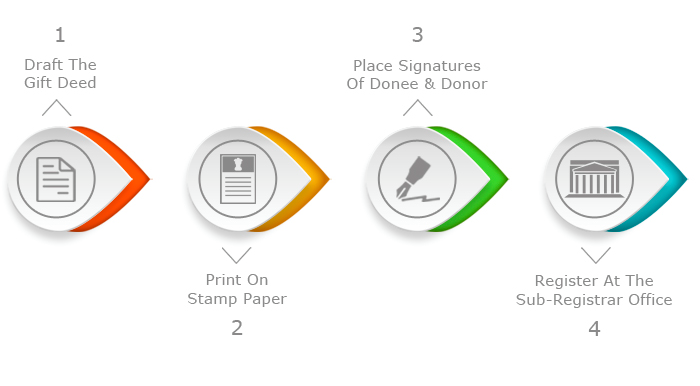

Online Legal Advice from Insaaf99® Online Lawyer Consultation in India


Online Legal Advice from Insaaf99® Online Lawyer Consultation in India

Thinking about gifting property to your loved ones? To ensure that your transfer is valid and legally abiding by the laws, it is important to explore the realm of gift deed registration.
Throughout this blog, we will describe you the key aspects of gift deed registration. We will help you in getting clarity about the necessary steps, legal requirements and potential challenges that may arise during the process of gift deed registration.
Also Read: - Demystifying Cyber Regulations: Understanding Cyber Laws in India Safeguarding India's Digital Landscape
Additionally, we will discuss the applicable fees, stamp duty and home registry charges in Delhi in order to help you facilitate a smooth registration process.
So, if you're ready to embark on this enlightening journey into the world of gift deed registration, let's dive in and explore the intricacies together!

The gift deed registration charges vary depending on the specific jurisdiction or country where the registration takes place. Generally, when registering a gift deed, you need to consider the following potential costs:
The gift deed registration charges in Delhi, India involves:
1. Stamp Duty: Stamp duty is applicable when registering a gift deed in Delhi. The stamp duty is calculated as a percentage of the property value or the gift value. In Delhi, the stamp duty rates for gift deed registration are as follows:
(A). Gift deed stamp duty in Delhi is different for males and females, as it is levied at 4% up to 7%.
2. Registration Fees: The registration fees in Delhi for gift deed registration is Rs. 1000.
To calculate the stamp duty and registration charges, you can follow these steps:
Step 1: Determine the property value or consideration amount.
Step 2: Research the applicable stamp duty rates for your jurisdiction. You can get these rates from the website of the local revenue or land registration authority.
Step 3: Calculate the stamp duty by multiplying the applicable rate by the property value or consideration amount.
Step 4: Determine the registration fees by checking the prescribed fees for registration in your jurisdiction. This is generally a fixed amount.
Step 5: Add the stamp duty and registration fees together to get the total amount payable.
The above steps are a general framework for calculating stamp duty and registration charges.
The Revenue and stamps department of Delhi provides a facility to calculate stamp duty online.
To calculate stamp duty online in Delhi, you can follow these steps:
The stamp duty in Delhi is governed by the Indian Stamp Act, 1899. The Act provides the legal framework for the imposition, calculation and collection of stamp duty on various instruments, including property transactions, leases, agreements, and deeds.
Here are some key provisions of the Delhi Stamp Act regarding stamp duty rates for property transactions:
1. Conveyance Deed: The stamp duty rate is currently 6% for males and 4% for females and certain other categories.
2. Gift Deed: The stamp duty rate for family members, including spouses, parents, children, and siblings, is currently 6%-7% for males and 4%-5% for females on the basis of certain other categories, such as valuation of property.
3. Lease Deed: Stamp duty for lease deeds is levied based on the term of the lease and the average annual rent.
The stamp duty rates in Delhi as of 2022-23 are different for males and females. The rates also differ for different regions (generally, NDMC and Delhi Cantonment).
| Category | Stamp Duty Rates in Delhi | Stamp Duty Charges in NDMC areas | Stamp Duty Charges in Delhi Cantonment Area |
| Male | 6 Percent (Below 25 Lac.) 7 percent (Above 25 Lac.) |
5.5 percent | 3 percent |
| Female | 4 Percent (Below 25 Lac.) 5 percent (Above 25 Lac.) |
3.5 percent | 3 percent |
| Joint Ownership | 6-7 Percent | 4.5 percent | 3 percent |
The registration charges for property in Delhi, India, are as follows:
House Registry Charges in Delhi as of 2022-23 generally do not differ for different genders. All buyers must pay 1% of the deal value beside the stamp duty.
Overall, a man will have to pay 7% (Stamp duty plus registration charges) of the property cost. At the same time, a woman will have to pay 5% (Stamp duty plus registration charges).
However, when a house is registered under joint registration (that is, on behalf of a male as well as a female), they will have to pay 6% of the property cost.
Also Read: - Worker's Rights Unveiled: Exploring The Protection of Labour Under Labour Law in India
In conclusion, gift deed registration is an important step if you're thinking of transferring property ownership as a gift. In this blog, we have provided you with valuable insights into necessary steps and duty charges involved in gift deed registration.
We hope that this guide has shed light on the complexities surrounding gift deed registration and provided you with the knowledge necessary to navigate the process successfully. Should you have further inquiries or require personalized assistance, do not hesitate to online lawyer consultation well-versed in property law.
The actual rates may vary depending on state wise and the circumstances of the gift. For accurate information with respect to stamp duty as per State wise, it is always best to consult with a lawyer or a property expert
With the information and insights gained from this guide, you are now better equipped to embark on the gift deed registration process confidently and secure the future of your property transactions.